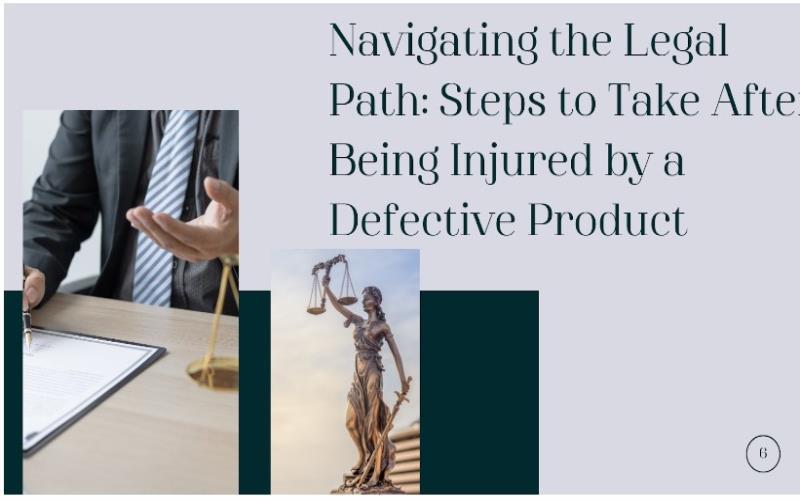While no one expects harm from the products they use daily, unfortunately, defective products can cause severe injuries. If you’ve suffered an injury due to a faulty product, it’s crucial to understand your legal rights, take the necessary steps to protect yourself, and file a claim.
This guide will walk you through the process of seeking justice and compensation after sustaining a personal injury through a defective product.
Recognizing a Defective Product Personal Injury
The first step in addressing a defective product is to identify the problem. Product defects can take various forms, including design flaws, manufacturing errors, or inadequate safety warnings. Some common signs that you may have a personal injury case include:
- Malfunctions or failure of the product to perform as intended
- Unexpected breakage or premature wear of the product
- Lack of proper safety instructions or warnings
- Injuries or adverse effects during normal use of the product
Let’s take a simple look at how often things go wrong with products we use every day, through a chart that shows last year’s recalls, from toys to cars, based on information from the CPSC.

If you suspect a product is defective and has caused you injury in the Myrtle Beach area, it’s crucial to seek medical attention immediately.
Thoroughly document your injuries and preserve the defective product as evidence; this will be vital for any potential personal injury lawsuit down the road. Having a Myrtle Beach personal injury attorney evaluate your case early on can also ensure your rights are protected from the start.
Immediate Steps After a Defective Product Injury
Once you’ve received medical care, it’s time to take action to protect your rights. Here are the immediate steps to follow after sustaining a defective product injury:
1. Document Everything
Thorough documentation is key when pursuing a personal injury case against a manufacturer:
- Photograph the defective product, injuries, and incident scene
- Get copies of all medical records and bills related to your injury
- Collect contact information for any witnesses
2. Report the Defective Product
Prompt reporting is crucial. Contact the manufacturer and report the details. Request they preserve evidence like production and quality control records related to the defective product.
File a report with the Consumer Product Safety Commission (CPSC) for consumer goods or the Food and Drug Administration (FDA) for defective medications/medical devices.
3. Seek Legal Counsel
Consult an experienced personal injury lawyer as soon as possible. Many offer free initial consultations to evaluate your personal injury case. A skilled attorney can:
- Advise you on your rights and the strength of your personal injury claim
- Investigate and gather evidence against the manufacturer
- Handle negotiations and represent you in personal injury lawsuits
- Ensure you meet all deadlines for filing a personal injury claim
- Fight for fair compensation for injuries, lost wages, personal injury protection, etc.
By taking these steps after a defective product, you protect your rights to hire a lawyer and pursue a personal injury claim or lawsuit against the negligent company.
Understanding Your Legal Rights
When a defective product causes harm, consumers have legal rights and may be entitled to compensation through a personal injury claim or lawsuit. Product liability laws hold manufacturers, distributors, and retailers responsible for ensuring their products are safe for intended use.
Types of Product Defects
Three main types of product defects can form the basis of a liability claim:
- Design Defects: These flaws are inherent in the product’s design, making it unreasonably dangerous even when manufactured correctly.
- Manufacturing Defects: These errors occur during the production process, resulting in a product that deviates from its intended design and specifications, introducing safety hazards.
- Marketing Defects: Also known as “failure to warn,” these defects involve inadequate instructions, safety warnings, or misleading advertising that fails to inform consumers about potential risks associated with the product.
Common Types of Product Liability Cases
| Product Liability Case Type | Description | Examples |
| Design Defect | Inherent flaw in the product’s design that makes it unsafe | Faulty brakes in a vehicle, unstable furniture, toys with choking hazards |
| Manufacturing Defect | Error during production that introduces a hazard | Contaminated food or medication, missing safety components, improperly assembled products |
| Marketing Defect | Inadequate warnings, instructions, or safety information | Lack of proper usage instructions, failure to warn about potential dangers, misleading advertising |
If you’ve been injured due to a defective product, you may be entitled to compensation for damages such as medical expenses, lost wages, pain and suffering, emotional distress, and in cases of egregious misconduct, punitive damages.
Pursuing Compensation in a Defective Product Personal Injury Case
If you’ve suffered injuries from a defective product, you may be entitled to significant compensation through a personal injury claim against the manufacturer or other liable parties. An experienced personal injury lawyer can help you fight for the following damages:
Medical Expenses
The product manufacturer should be held liable for all medical expenses related to treating your defective product injury, including hospitalization, surgeries, doctor visits, medications, physical therapy, and any future anticipated medical costs.
Lost Wages and Diminished Earning Capacity
Serious injuries can force you to miss work during recovery or leave you unable to perform the same job duties and earn the same income as before the incident. You deserve compensation for those lost wages as well as damages for any permanently diminished future earning capacity.
Pain and Suffering Damages
The physical and emotional trauma of a defective product injury can be immense. You may be entitled to compensatory damages for the pain, suffering, and diminished quality of life caused by the manufacturer’s negligence.
Emotional Distress
The psychological impacts like anxiety, depression, or PTSD from a severe product defect injury can linger long after the physical wounds heal. Compensation for emotional distress helps account for this.
Punitive Damages
If the personal injury case reveals that the manufacturer engaged in outrageously reckless or malicious conduct, showing a blatant disregard for public safety, punitive damages may be awarded to punish the company and deter similar behavior in the future.
Don’t let a defective product hazard derail your life. If you or a loved one suffered harm from a faulty product, take decisive legal action right away to receive the justice and fair compensation you are owed.
Building a Strong Case: The Importance of Evidence
To succeed in a product liability case, you’ll need to establish that the product was defective and directly caused your injuries. This requires strong evidence, which may include:
- The defective product itself
- Expert testimony from engineers, designers, or medical professionals
- Witness statements
- Accident reports or incident documentation
- Photographs or videos of the defective product and your injuries
Your personal injury lawyer will work with you to gather and analyze the necessary evidence to build a compelling case.
Selecting the Right Personal Injury Lawyer
When pursuing a defective product injury claim, the lawyer you choose can significantly impact the outcome of your case. Look for an attorney who:
- Has a proven track record of successful liability cases
- Offers a free initial consultation to evaluate your claim
- Works on a contingency fee basis, so you don’t pay unless they win
- Demonstrates a strong commitment to client communication and advocacy
- Possess extensive knowledge of relevant product liability laws
Don’t hesitate to interview multiple lawyers before making your decision. The right legal counsel can make all the difference in ensuring you receive the maximum compensation you deserve.
Protect Your Rights and Seek Justice
If you or a loved one has been injured by a defective product, it’s essential to take action promptly. Seek medical care and document everything. Report the issue to the manufacturer and relevant agencies.
Consult a personal injury lawyer immediately to protect your rights and pursue a claim for damages like medical bills, lost income, and pain/suffering. Manufacturers must ensure product safety – hold them accountable through legal action.
FAQs: Addressing Common Concerns
-
How long do I have to file a product liability claim?
The statute of limitations for filing a product liability claim varies by state, but it’s typically between one and six years from the date of the injury or the discovery of the defective product. It’s crucial to act promptly to preserve your rights.
-
Can I file a claim if I wasn’t the original purchaser of the defective product?
Yes, product liability laws protect anyone who may be harmed by a defective product, including bystanders, borrowers, or used product purchasers.
-
What if the manufacturer or retailer goes out of business?
Even if the company responsible for the defective product is no longer operating, you may still be able to pursue compensation through their insurance policies or other available assets.
-
How much does it cost to hire a personal injury lawyer?
Most personal injury lawyers work on a contingency fee basis, which means they only get paid if they successfully recover compensation for you. Their fees are typically a percentage of the settlement or award.





